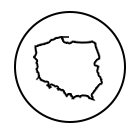Wladyslaw and Maria Dydyn from the village of Zawadówka
 Place
PlaceZawadówka
 People
PeopleDydyn Władysław
Dydyn Maria
Władysław and Maria Dydyn lived in the village of Zawadówka (Tarnopole province). In the year 1942, under the cover of darkness, Jewish family knocked on their doors: ChawaIta Czeret (maiden name Klein) together with her children: Bronia, Henia and Chaima, and her brother’s-in-law wife Biuta Klein. “That night ChawaIta Klein said to my grandmother Maria: Either kill me or surrender me to Germans. I’m not going anywhere. Grandmother cried and begged, saying that she has children of her own, asking Chawa to understand the danger that she was putting them in”. No amount of excuses mattered. The family stayed. The Jews hid in the shelter that Władysława built earlier. “After a few days, when German troops entered their backyard, the situation became dangerous. They occupied the yard surrounded by fence, on which they set their field kitchen and weapon storage. Soldiers guarded the place day and night allowing only children to move freely in the yard”.
The elder of Dydyn’s daughter, Stanisława, avoided the vicinity of stables, so as not to rise the suspicion of Germans and expose the shelter. Anna, eleven years old at the time, was the one going to the hideout most of the time. “When soldiers on guard duty stopped my mother carrying food inside milk jug, she was supposed to say that she was going to fed the animals”. Shelter was arranged in such a way,that after entering the cowshed you had to move the wooden crib and go down the ladder to reach the small room. From there, you could reach the second part of the hideout. “There was very little room inside, there were no windows, and its walls were thin, not providing any protection against cold”. When winter came and it was really cold outside, Dydyns provided the Jews with additional clothes and sheepskins. Still, they became ill. “ They had to cough with their face pressed into the pillow so that the Germans wouldn’t hear them. They spent their time in darkness, because they couldn’t use candles and only lighted the lamp once in a while[…]. Both families lived in great fear for their lives”.
The shelter was a safe place until Binka left it one day to go to the neighbouring village for her clothes. She returned the same night that she left. It was also at that time that she told someone of her hiding place, which turned out to be a rash and disastrous decision. Gestapo officers entered the Dydyns’ house early in the morning. Everyone was questioned. All children included, together with Staszek, who was four years old at the time. Despite his young age, he realized the grave danger his family was in. He didn’t say anything about Jews, even though the Gestapo officer was offering him chocolate. Germans ordered the Dydyn family to stand against the wall in the corridor. Maria cried and trembled, worried about the fate that awaited them. Governor, which was summoned and came together with the Gestapo, said to her: “Marylko, you have doomed your children”. Germans knew that the Jews were hiding inside the barn. The commanded the chief to take them to it. “[…] Fortunately, two identical barns and cowsheds stood on the same yard.One of them belonged to my uncle and aunt. Governor, knowing that Jews were inside my grandparents barn, led the Gestapo to my aunt and uncle’s bar, which was close to my grandparents’ house. The barn, in which the Jews were hiding, was near the house of my uncle and aunt“. Gestapo didn’t find anyone and the officers left. After few hours Maria dared to go to the Jews hideout. It was then that she learned why the Germans searched her house.
Jews stayed at Dydyns’ place until 1944. Władysława brought them on a hay-covered wagon a few villages further. “After the war, even though both families didn’t know each other for long, they became friends. My mother, Anna Paulina Król maiden name Dydyn, kept in touch with one of the Jewish family daughters , Bronia Sofer. Władysław and Maria were rewarded for their bravery and heroism by the Yad Vashem Institute with the title of Righteous Among the Nations.
Bibliography:
- FLV, List od Krystyny Lubiszewskiej, Wrocław, 10.06.2014 r.
DOCUMENTS:
No extra materials